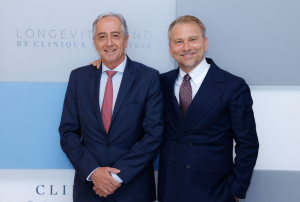“France, a land of excellence in terms of engineering, research, medicine and entrepreneurship, has all the strengths in hand to become a world leader in MedTech,” says Guirec Le Lous, President of the MedTech in France association
France is a country primarily located in Western Europe. It also comprises of overseas regions and territories in the Americas and the Atlantic, Pacific and Indian Oceans. Its metropolitan area extends from the Rhine to the Atlantic Ocean and from the Mediterranean Sea to the English Channel and the North Sea; overseas territories include French Guiana in South America, Saint Pierre and Miquelon in the North Atlantic, the French West Indies, and many islands in Oceania and the Indian Ocean. Due to its several coastal territories, France has the largest exclusive economic zone in the world. France borders Belgium, Luxembourg, Germany, Switzerland, Monaco, Italy, Andorra, and Spain in continental Europe, as well as the Netherlands, Suriname, and Brazil in the Americas via its overseas territories in French Guiana and Saint Martin. Its eighteen integral regions (five of which are overseas) span a combined area of 643,801 km2 (248,573 sq mi) and contain close to 68 million people (as of July 2022).
 France is a unitary semi-presidential republic with its capital in Paris, the country’s largest city and main cultural and commercial center; other major urban areas include Marseille, Lyon, Toulouse, Lille, Bordeaux and Nice.
France is a unitary semi-presidential republic with its capital in Paris, the country’s largest city and main cultural and commercial center; other major urban areas include Marseille, Lyon, Toulouse, Lille, Bordeaux and Nice.
French healthcare sector
France has a high quality healthcare system that offers universal coverage for all citizens, regardless of age or economic situation. It consists of an integrated network of public and private services including doctors, hospitals, and specialist providers.
The Ministry of Social Affairs and Health (Ministere des Solidarites et de la Sante) administrates public healthcare in France, with primary and secondary care services delivered by the various different healthcare providers. France offers a high level of preventativehealthcare, with available services including addiction prevention, regular medical check-ups, and the promotion of physical activity and healthy eating.
France is ranked 11th on the 2018 Euro Health Consumer Index and has been praised for its efficiency and outcomes. For example, the country has the lowest heart disease mortality in Europe, although it has been criticized for its over-reliance on prescription medication.
Public healthcare in France is accessible by all residents through French health insurance contributions. As of 2016, a new healthcare system for foreigners, known as Protection Universelle Maladie (PUMA), allows access to state healthcare after three months of residence.
By law, all residents must have some for of health insurance, whether state or private. If your household income falls below a certain threshold, you may be eligible for free commentary health insurance coverage (CMU-C) or help in taking out supplementary private health insurance (Aide pour une Complémentaire Santé or ACS).
If your application for legal residence has not been nalized, you may be eligible for State Medical Assistance (Aide Médicale d’Etat or AME). For more detailed information, visit the CMU.
Temporary visitors to France from the EU/EEA/Switzerland can access public healthcare if they have a European Health Insurance Card (EHIC). Retirees from the EU/EEA/Switzerland relocating to France can access healthcare services by completing a social security S1 form in their home country.
Medical technology sector
With 1,502 companies, generating annual turnover of €30 billion, France is Europe’s second-largest medical technologies market, behind Germany. It ranks third amongst European countries in terms of employment, with 89,130 people employed. French companies, 93% of which are SMEs, operate in a wide range of fields, from e-health to surgical robotics, telemedicine, optical technologies, scar management, medical imaging and many more.
“France, a land of excellence in terms of engineering, research, medicine and entrepreneurship, has all the strengths in hand to become a world leader in MedTech,” says Guirec Le Lous, President of the MedTech in France association, which was created in 2013 and whose ambition is to enable the emergence of French champions in medical technologies.
The sector’s growth is supported by the strong internationalization of its players: the French companies in the sector generate a turnover of €9 billion from export, growing by almost 10% between 2017 and 2019. By way of comparison, the industry’s growth rate is 4% over the same period.
The sector is characterized by products with a short life cycle and continuous innovation. The proportion of turnover devoted to R&D reached 6% in 2019 and almost 13% of companies operate exclusively in R&D.
On the strength of this dynamism, France ranks fifth worldwide in number of European and international patents filed in the medical devices sector, with 3,750 patents per year. Companies in the sector have the benefit of a public R&D ecosystem that enjoys international renown: France has a culture and public funding system that is favourable to R&D, with, in particular, solid upstream innovation support tools, such as the Innovation Tax Credit (CII) and the Research Tax Credit (CIR), combined with excellent clinical and academic research.
This support was stepped up even further in the wake of the Covid-19 health crisis, as the Government took action to strengthen France’s independence in access to medicines and medical devices. To wit, the State dedicated nearly €200 million to the development of the healthcare industry to encourage research and production in the sector.
French Biotech sector
For many people France is synonymous with wines, cheese and rich meals. But the country also has a strong biotech community that how grown significantly over the past decade, with a strong focus on developing clinical drug assets.
France has several well-known pharma companies that are cornerstones for the industry, including Sano, Ipsen, Servier, Pierre Fabre and LFB Biotechnologies.
Earlier this month, France Biotech, which represents life science entrepreneurs, released its 16th “French Health Tech Survey,”that showed the transformation of the French biotech environment over the past decade has grown to include more than 1,800 companies with a broad focus on multiple aspects of the healthcare space. According to the survey, France’s life science industry includes 720 biotech companies, 73 biocleantech companies, 886 companies specialized in medical devices and diagnostics and 200 companies focusing on eHealth. The latest survey shows that more than half of these companies, 53 percent, employ one to 10 employees. Also, many of these companies have sprung into existence over the past several years. According to the survey, 41 percent of the companies are less than five years old.
 The France Biotech survey included 365 French companies that employ about 9,438 people. Maryvonne Hiance, president of France Biotech, said the French biotech industry is able to draw from a range of new technologies that help it grow. One area that Hiance and France Biotech see growth is through the use of artificial intelligence and big data. About one-third of the surveyed companies already use these technologies and the other two-thirds of companies that participated in the survey said they intend to start using them in the future. Hiance said this is a key area for improvement in the sector.
The France Biotech survey included 365 French companies that employ about 9,438 people. Maryvonne Hiance, president of France Biotech, said the French biotech industry is able to draw from a range of new technologies that help it grow. One area that Hiance and France Biotech see growth is through the use of artificial intelligence and big data. About one-third of the surveyed companies already use these technologies and the other two-thirds of companies that participated in the survey said they intend to start using them in the future. Hiance said this is a key area for improvement in the sector.
One of the key strengths of the French biotech industry that the survey revealed is the amount of research and development being conducted, particularly as it compared to the sector 10 years ago. The survey showed that in 2018, there are 386 drug candidates in clinical development by the companies that participated, compared to only 178 in 2008. For these companies, R&D investments on average were €9 million, about $10.2 million. Of the companies that participated in the survey, at least 15 percent of their total expenses are made in R&D.
Hiance said that the R&D work being conducted the biotech companies sampled in the survey is actually a greater amount than the companies she called “the main French pharmaceutical companies.” The abundance of projects developed by innovative health startups is a key growth driver for big pharma and biopharma companies looking to innovate and renew their product portfolios, she said.
In addition to a focus on R&D, the survey also noted that for these companies, there is a focus on international growth. The survey showed that 64 percent of the companies that opened subsidiaries over the past decade, did so abroad, with the United States begin the preferred location. Since 2013, these types of international partnerships are on the rise, increasing from 25 percent in 2013 to 33 percent this year.
The international arena is also playing a key role when it comes to investments. The survey showed an uptick in the amount of global investments made in the French biotech sector. France Biotech said the trend of foreign investment can be explained by the “sustained interest of foreign investors in medical technologies, at a time when digital technology and patient data management are revolutionizing the industry.”
While the R&D and the increase in foreign dollars is a bright spot, the France Biotech survey did show a few difficulties affecting the industry in that country. France Biotech noted that a majority of the companies that participated in the survey are struggling to nd the funding they desire. Also, the survey showed that about half of those companies reported having difficulties in raising money. From the survey, 75 percent of the firms sampled believe that industrial partnerships are the way forward to draw funding.
“Let us ensure that all of the players in our ecosystem, including startup companies, public agencies, researchers and healthcare institutions, work together to build the medicine of the future, entirely dedicated to patients,” Hiance said.









